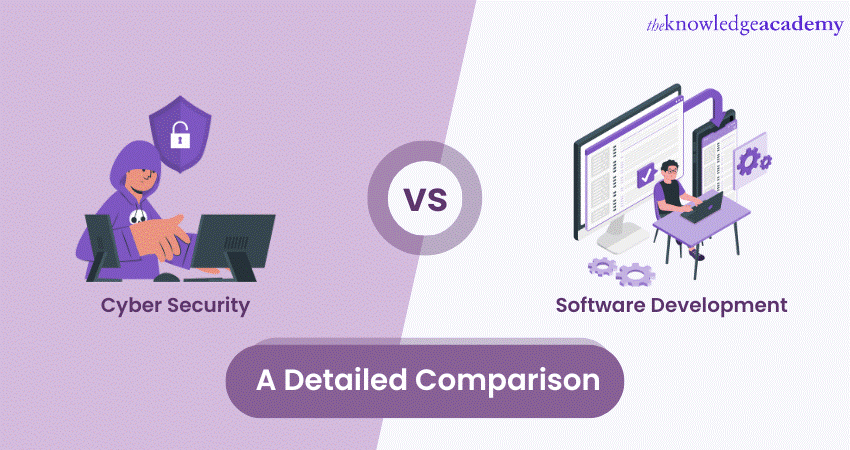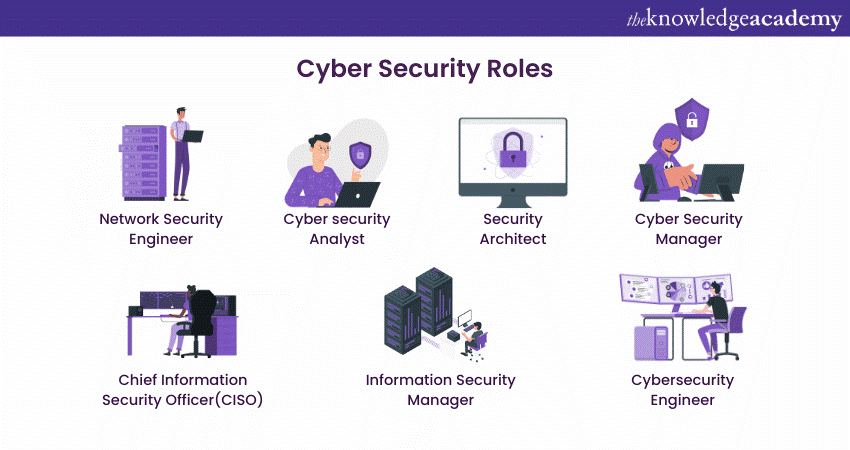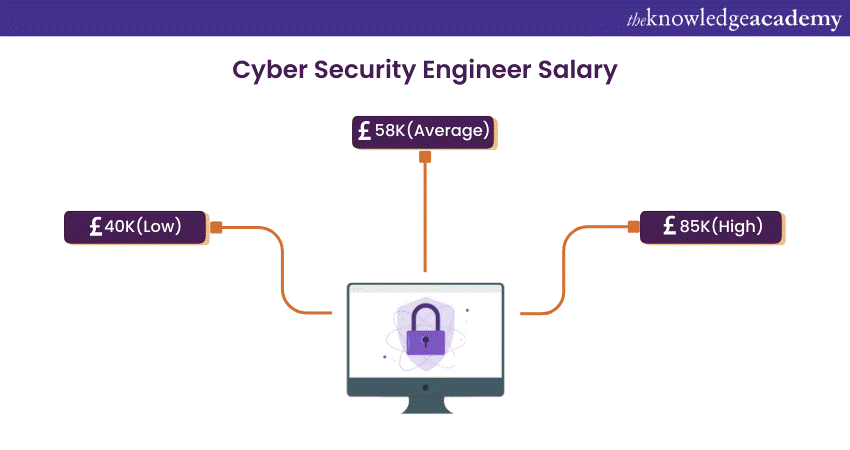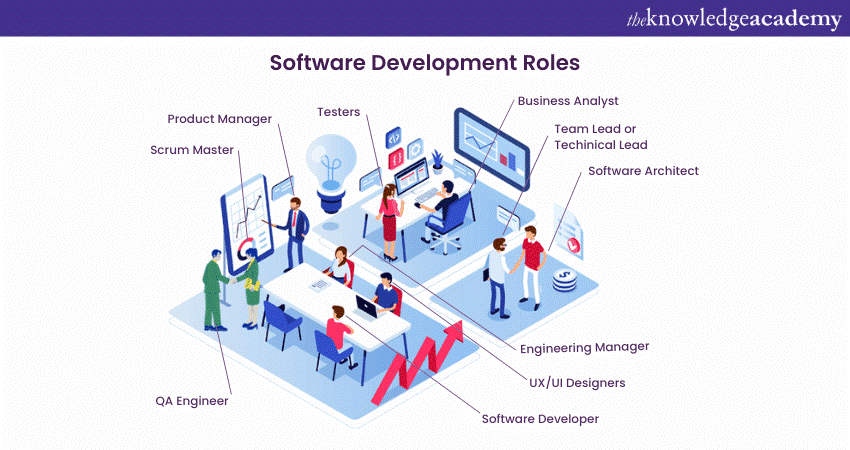We may not have the course you’re looking for. If you enquire or give us a call on +971 8000311193 and speak to our training experts, we may still be able to help with your training requirements.
Training Outcomes Within Your Budget!
We ensure quality, budget-alignment, and timely delivery by our expert instructors.

Today, Cyber Security and Software Development have become the two most prominent career choices out of many paths available in the Information Technology (IT) domain. However, candidates looking to build a strong career in this field often stand at a crossroads when choosing the best option. This is why understanding the differences between Cyber Security vs Software Development is crucial to determine which one is better and what to choose.
According to Statista, Cyber Security and Software Development are expected to show an annual revenue growth rate of 10.56% and 6.50%, respectively. So, the future looks promising for both of them.
Before you decide to pursue one of them as a career, isn't it necessary to consider which one is better for you? That’s exactly what this blog is all about. In this blog, you will learn about all the differences between Cyber Security vs Software Development. Let’s dive in deeper to learn more!
Table of contents
1) What is Cyber Security?
a) Cyber Security roles
b) Cyber Security skills
c) Cyber Security job opportunities
d) Cyber Security salary
2) What is Software Development?
3) Cyber Security vs Software Development: What’s the difference?
4) Conclusion
What is Cyber Security?
Let's understand What is Cyber Security. It is a terminology that describes all actions and countermeasures taken to keep your digital possessions safe from unauthorised access and malicious cyber security attacks. Some such possessions can be your important documents, bank account details or pictures that reveal the identity of your close ones.
Cyber Security ensures such vulnerable and important data stays protected from theft, destruction and corruption. It implements safety measures against these attacks by either creating defense mechanisms against them or educating the users about them, thus raising their awareness about Cyber Security Essentials.

Cyber Security Roles
A Cyber Security Specialist is supposed to protect individual systems and Information Technology (IT) infrastructures from unauthorised access. Thus, it helps in preventing data theft and data loss. This is done by implementing safety measures against threats. These specialists also detect any flaws existing within the current infrastructure, such as weaknesses and flaws within software or hardware, which makes them susceptible to cyber-attacks. The following are the various roles that these professionals play:
They are responsible for passive safety measures, such as firewall integration in the networking system. This prevents the potential for misuse and gives a secure system to users. On another note, they are also responsible for taking active measures against potential threats by monitoring any signs of intrusion.

Cyber Security skills
To work in the field of Cyber Security, you need to possess a specialised and particular set of skills. These encompass both technical and non-technical skills such as effective communication, problem-solving, coding, testing, Reverse Engineering, and many more.
Since Cyber Security is a highly specialised field, most Computer Science degrees cover its scope. Many times, a degree is not considered enough. Thus, several security professionals either get certified in Cybersecurity or pursue a master's degree to help improve their careers.
Interested in becoming a Cyber Security Specialist? Join our Cyber Security Training now!
Cyber Security job opportunities
There are multiple specialised roles in Cybersecurity. Each of these roles helps reinforce online security in the digital infrastructure. If you wish to consider Cyber Security as a career path, it is vital to understand the field's roles. Some of them are listed below:
a) Cyber Security Engineer: Their job is to design and implement safety measures to protect against malicious actions. They also perform additional functions like administrating and maintaining an IT infrastructure's system.
b) Network Security Administrator: These individuals manage and implement security procedures, to keep computer networks safe. They work closely with other IT staff, like System Administrators, to ensure security in all network instances.
c) Computer Forensic Analyst: It is a role closely associated with law and legality. A Computer Forensic Analyst is expected to collect and preserve data as digital evidence. They have to retrieve data across different kinds of digital storage with the help of various software tools.
Computer forensic analysts are expected to have excellent communication skills, work closely with law enforcement and present their gathered evidence in court. Computer forensic analysts' job is not limited to just law enforcement, as they also work with a private organisation if need be.
d) Cyber Security Analyst: Their job is to monitor a network infrastructure while observing user activity and traffic patterns and reporting any possible threats. Cyber Security Analysts often educate other employees within an organisation on how to protect their respective systems against data breaches.
Cyber Security salary

According to Glassdoor, Cyber Security professionals have an average base pay of about £57,128 annually, while experienced professionals can command a much higher salary. Moreover, enhancing your skillset and continuous learning will help you stand out from the competition and increase your pay in the process.
Wish to learn more about Cyber threats? Register for our Cyber Security Awareness Course!
What is Software Development?
Now, let's focus on Software Developers. It is a role that works with the Software Development Life Cycle (SDLC). It includes all tasks and methods involved in delivering software, such as designing, creating, maintaining, and debugging.
This field of work includes many miscellaneous roles and tasks. These tasks include designing the software, coding, interface and visual creation, and work distribution and team management. Responsibilities in software programming comprise testing, improving and maintaining the product, ensuring the software is working smoothly for their customers
Software Development roles
Software Development is a client or customer-facing job. As a result, the primary duty of Software Developers is to understand and meet the client's requirements. Once they are done designing and writing codes for software, they are expected to test and maintain their code, ensuring its smooth function. The following are some roles included within Software Development:

Software Developer skills
Software Developers share a certain amount of skills with their Cyber Security-based counterparts, such as coding, database management, analysis, and more. Since Developers are expected to work as a team, skills like teamwork and leadership help them a lot while working on different projects. A Software Developer is also required to have a strong understanding of different coding languages, both object-oriented languages like Java and structure-oriented languages like C, Modula-2 and Pascal. They should also be well-versed in the usage of compilers and different operating systems like UNIX and Linux.
Software Developers are supposed to have algorithm development skills alongside the ability to code. This ensures they get the most work done with the least amount of coding required. After getting a Bachelor's degree or higher in Computer Science, you can pursue software programming as a career path. A related degree, like a Bachelor's degree in Data Science, can also help you to become a Data Engineer or a Data Scientist.
Software Developer job opportunities
When it comes to job opportunities in Software Development, the first and obvious choice almost always happens to be a "Software Engineer". It is a term used so frequently in the field that they are almost interchangeable. However, you might be surprised to know a Developer and an Engineer are fundamentally two different roles. Here is a basic description and details of job roles in Software Development:
a) Software Engineer: A Software Engineer should know how to create the framework and tools necessary to create the software. They should focus on creating the software with help from those tools and frameworks. Software Engineering requires a strong knowledge of various programming languages such as Java, C++, Scala and Python. They are also expected to have a strong understanding of command-based Operating Systems (OS) like Linux and Unix.
b) Full Stack Engineer: A Fullstack Engineer is expected to know the coding languages used on both ends of the software. They need to be able to work either by themself or as a part of a team according to the needs of the software life cycle.
c) System Engineer: They design a system based on specific needs or requirements. They need to be well versed in using OS, software and necessary programming language. They are expected to be able to create a system, test it for proper functioning as well as maintain it over time.
d) Cloud Engineer: They are expected to design and develop applications and protocols that work well with cloud-based services. Cloud works on providing resources like storage and processing, which are not present on-premises. Due to this, Cloud Engineers are supposed to account for cloud-based storage capacity and security. They are also tasked with training the non-technical staff on how to save and retrieve data safely on cloud storage.
Interested in engineering as a profession? Join our course in Software Engineering Courses.
Software Developer salary
According to Glassdoor, Software Developers have an average base pay of £57,128 annually in the UK, with an additional cash compensation ranging from £2,700 to £11,000. Certain professions, like Java Developers, can even have a significantly higher average base pay of £60,618 annually. Thus, giving Software Developers giving software developers an all-over better pay grade and salary expectations and making it a clear winner in Cyber Security vs Software Development salary comparison. an all-over better pay grade and salary expectations and making it a clear winner in in Cyber Security vs Software Development salary comparison.
Wish to learn more about Cyber Security and its risks? Join our Cyber Security Risk Management Course now!
Cyber Security vs Software Development: What’s the difference?
Cyber Security and Software Development share many similarities, yet both fields offer you different career insights. They both require a good grasp of programming languages and Operating System (OS) infrastructures. Good interpersonal and communication skills are vital to working in both these roles.
But it’s equally important to understand their differences in order to build a strong and promising career. So, let’s visually understand the differences between Software Development vs Cyber Security:
|
Criteria |
Cyber Security |
Software Development |
|
Education |
Bachelor's degree in Computer Science, Information Technology, or Cyber Security |
Bachelor’s degree in Software Development, Computer Science, or a related field. |
|
Roles |
Security Analyst, Penetration Tester, Security Engineer, Security Architect |
Software Engineer, Mobile Developer, Web Developer, DevOps Engineer, Quality Assurance (QA) Engineer |
|
Skills |
a) Technical skills: Networking, security tools, and programming languages. b) Soft skills: Communication, problem-solving, and teamwork. |
a) Technical skills: Programming languages, Software Development tools, and databases. b) Soft skills: Communication, creative thinking, leadership and teamwork |
|
Job opportunities |
Government agencies, private companies, financial institutions, healthcare organisations |
Private companies, startups, government agencies, non-profit organisations |
|
Salary |
Varies depending on experience, skills, and location. Entry-level salaries typically start in the £40,000-£85,000 range. Experienced professionals can earn over £85,000 per year. |
Varies depending on experience, skills, and location. Entry-level salaries typically start in the £43,000-£78,000 range. Experienced professionals can earn over £80,000 per year. |
Although, their responsibilities and skills may seem similar, but on a deeper level, they are essentially different roles with different purposes. Software Developers create software to bring convenience to their customers. They create programs enabling users to save data on their devices or the cloud. A Cyber Security Specialist protects that data from getting into the wrong hands, misused, or destroyed.
Interested in becoming a Cyber Security Specialist? Join our Cyber Security Training now!
Conclusion
A comparison of Cyber Security vs Software Development can help you decide the career that you want to pursue. This blog would have given you clarity on which one is better, Software Development or Cyber Security and what to choose. Both are equally good career paths, with growth prospects in knowledge and salary.
Become a Software Engineer Specialist with our Software Engineering Courses – sign up now!
Frequently Asked Questions

Cyber Security and Software Development are related because they both involve working with software systems and technologies. However, they have different goals and approaches. Cyber Security aims to protect software systems from cyber threats and vulnerabilities, while development aims to create and implement software programs.

Cyber Security professionals need to have skills in encryption, penetration testing, threat analysis, and incident response, while Software Developers need to have skills in programming languages, software engineering principles, debugging, and testing.

The Knowledge Academy takes global learning to new heights, offering over 30,000 online courses across 490+ locations in 220 countries. This expansive reach ensures accessibility and convenience for learners worldwide.
Alongside our diverse Online Course Catalogue, encompassing 17 major categories, we go the extra mile by providing a plethora of free educational Online Resources like News updates, Blogs, videos, webinars, and interview questions. By tailoring learning experiences further, professionals can maximise value with customisable Course Bundles of TKA.

The Knowledge Academy’s Knowledge Pass, a prepaid voucher, adds another layer of flexibility, allowing course bookings over a 12-month period. Join us on a journey where education knows no bounds.

The Knowledge Academy offers various Software Engineering Courses, including Software Development Lifecycle Training, Software Design and Architecture Training and Agile Software Development Training. These courses cater to different skill levels, providing comprehensive insights into Software Engineering methodologies.
Our Programming & DevOps Blogs cover a range of topics related to Software Engineering, offering valuable resources, best practices, and industry insights. Whether you are a beginner or looking to advance your Software Engineering skills, The Knowledge Academy's diverse courses and informative blogs have you covered.
Upcoming IT Security & Data Protection Resources Batches & Dates
Date
 Certified Cyber Security Professional (CCS-PRO)
Certified Cyber Security Professional (CCS-PRO)
Fri 6th Dec 2024
Fri 21st Mar 2025
Fri 23rd May 2025
Fri 22nd Aug 2025
Fri 5th Dec 2025







 Top Rated Course
Top Rated Course


 If you wish to make any changes to your course, please
If you wish to make any changes to your course, please


